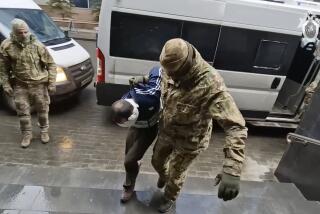China says Islamic radicals were behind violence in Kashgar
- Share via
Reporting from Beijing — Chinese authorities said Monday that Islamic radicals trained in Pakistan to wage “holy war” were responsible for attacks over the weekend in the western city of Kashgar that left at least 19 dead.
The violence in Kashgar — along with a similar incident last month in the nearby city of Hotan in which 20 people were killed — are the most serious in the region since 2009. Kashgar was under a strict curfew Monday, with most schools and many businesses closed.
Kashgar’s local government said on its website Monday that one of the attackers had confessed to receiving training in explosives and firearms at a camp in Pakistan run by the East Turkestan Islamic Movement, a group opposed to Chinese rule in western China.
Uighurs, a Turkic minority that once dominated northwestern China, call the region East Turkestan. Many resent an influx of ethnic Han migrants from elsewhere in China, who they say have received the best pickings of jobs and housing.
“The suspects harbored thoughts of religious extremism. The outbreak of violence was absolutely no random occurrence,” the Kashgar municipality said in Monday’s statement. “They wanted to disturb social stability, incite ethnic hatred and create conflicts between ethnic groups in order to split Xinjiang from the motherland,” it said.
It was not possible to independently confirm Chinese accounts.
Officials said the attack Saturday night involved the hijacking of a van stopped at a red light that was then used to plow into a crowd. On Sunday, attackers created a decoy at a restaurant with homemade explosives and then used knives to attack police and firefighters who rushed to the scene, according to authorities.
Rohan Gunaratna, a Singapore-based professor, said the violence could have been conducted or influenced by the East Turkestan Islamic Movement.
“These attacks in Kashgar might have been inspired by its ideology, or they might have received some technical training” from the movement, said Gunaratna, one of the few experts on the group.
He added, though, that the movement had been weakened by the killing of its leader, Hasan Mahsum, in a counter-terrorism operation conducted by the Pakistani army in 2003. “Keep in mind that the [East Turkestan Islamic Movement] today is a very weak organization with under two dozen members who travel back and forth between China and Pakistan,” he said.
Kashgar, which lies about 180 miles from the Pakistani border, has been designated a special economic zone by the Chinese government in the hope it can be turned into a manufacturing and trade hub along the lines of Shenzhen.
“Police are everywhere in the city. We do feel scared, but less so because of the police presence,” Liu Liming, 32, a hotel clerk who migrated to Kashgar from Hunan province, said Monday in a phone interview. “There have been some cancellations of bookings at our hotel because of the attacks. This month is usually a popular season for tourists.”
Chinese authorities virtually closed down the city Monday. Most photographs and witness accounts were immediately deleted from Twitter-like microblogs.
“All the shops are closed. There’re no street vendors either. Please, everyone pay attention to Kashgar! I don’t want my hometown’s momentum of growth to be put out like this before it gets a chance to take off,” wrote one person who was able to file a posting under the name Han Xiao.
“Everyone in this city knows what happened. You can delete our blog posts, but can you delete the anger in our hearts?” wrote another.
Tommy Yang of The Times’ Beijing bureau contributed to this report.
More to Read
Sign up for Essential California
The most important California stories and recommendations in your inbox every morning.
You may occasionally receive promotional content from the Los Angeles Times.













